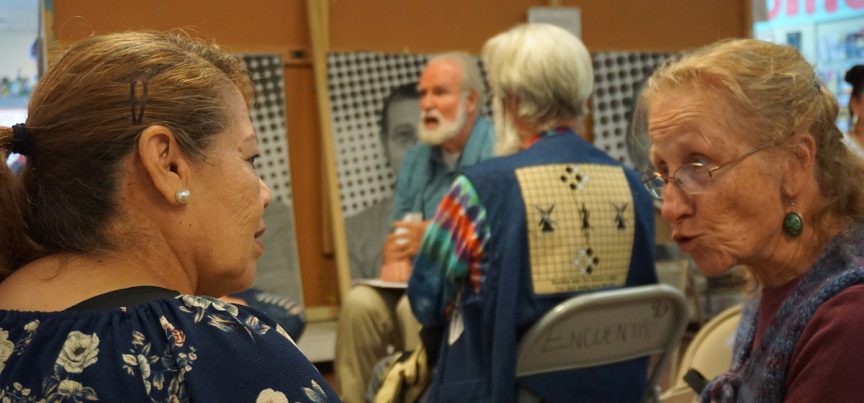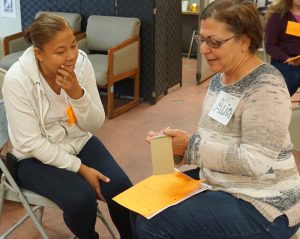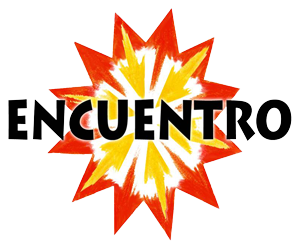
Pat Bonilla y el Rol de Voluntarios en Clase/Pat Bonilla and the Role of Volunteers in Class
 Las clases para adultos inmigrantes en Encuentro comenzaron en septiembre y tenemos un cien por ciento llenas las clases, incluyendo las de inglés como segundo idioma (ESL), accesible a estudiantes en sus tres niveles: inicial, intermedio y avanzado. Nuestros maestros de inglés son: Pat Bonilla, Queta Lindenberg, Patricia Beres y Larry Moore. Ellos dedican su energía profesional y personal para abrir la puerta del inglés a nuestros estudiante
Las clases para adultos inmigrantes en Encuentro comenzaron en septiembre y tenemos un cien por ciento llenas las clases, incluyendo las de inglés como segundo idioma (ESL), accesible a estudiantes en sus tres niveles: inicial, intermedio y avanzado. Nuestros maestros de inglés son: Pat Bonilla, Queta Lindenberg, Patricia Beres y Larry Moore. Ellos dedican su energía profesional y personal para abrir la puerta del inglés a nuestros estudiante
Para el inmigrante en Estados Unidos, hablar, leer y escribir inglés es una ventaja esencial que le capacita a comunicarse: captar, comprender y responder a las situaciones con que se enfrentan en la vida diaria. ¿Cómo pueden conseguir un trabajo si no hablan inglés? ¿Cómo pueden expresar sus necesidades e ideas? El inglés, con su compleja pronunciación y gramática, es un gran reto que requiere tanto del maestro como del estudiante un compromiso de gran esfuerzo.
Existe otro elemento importante contribuyendo a este éxito de aprendizaje que debemos reconocer: el voluntario que apoya al estudiante. La maestra Patricia Bonilla coordina un grupo de doce voluntarios que hablan inglés para su clase de nivel inicial. Les da una preparación para participar en conversaciones dinámicas de práctica sencillas. Ser voluntario no es tan complicado. Ser voluntario no es ser tutor y eres parte de la clase. Tu rol es sostener dicha conversación con el estudiante una hora de clase por semana. “Una de las claves para el estudiante es obtener confianza en la conversación. ¿Cuántas veces dices que entiendes y lees el inglés pero no lo puedes hablar?” dice la maestra Bonilla. “A lo largo que avanzan las clases te das cuenta que si puedes hablarlo.”
Otra manera de ganar esa confianza para hablar el inglés es cuando vas desarrollando amistad con los voluntarios, y se crean nuevos lazos. “Mi trabajo es facilitar en grupos pequeños estas conversaciones. El nerviosismo se vence y hasta se convierte en algo divertido el practicar tu inglés. Usualmente para la tercera semana ya no hay nerviosismo. Esto se llama ‘aprendizaje interactivo’. Aprendes al hacerlo, actúas en roles al hablarlo.” continúa Bonilla.
Ser buen maestro y buen voluntario puede tomar muchos años. Eres Testigo de la valentía que pone el estudiante en la clase. ¡Y ves que todo ese esfuerzo vale la pena¡
_______________________
Classes for immigrant adults in Encuentro started in September have started and we are at one hundred percent enrollment, including the English as a Second Language (ESL) program, which is available to learners at beginner, intermediate and advanced levels. Our English teachers are Queta Lindenberg, Pat Bonilla, Patricia Beres and Larry Moore. They dedicate professional and personal energy to opening the door of English language to our students.
For immigrants in the United States, speaking, reading and writing English is essential to successful communication; to perceive, understand and respond to life situations they confront every day. How can immigrants obtain employment if they don’t speak English? How can they express their needs and ideas? English, with its complex pronunciations and grammar, is a great challenge that requires commitment and effort from teachers and students. Because of their die-hard dedication, students are learning.
There’s an important element contributing to this learning success we must recognize: the volunteer who supports the student. Teacher Pat Bonilla coordinates a group of twelve English-speaking volunteers and prepares them to participate in simple dynamic conversation practices with her beginning level ESL students. Becoming a volunteer isn’t complicated. A volunteer in Teacher Bonilla’s class is part of the class. Their role is to encourage conversations with an ESL student for one hour per week. “Building confidence to speak English is an important key for the students. Many times they will say they understand English, and even know how to read it, but they can’t speak it.’ says Bonilla. “However, as class advances, they realize they can also learn to speak it!”
Another way of gaining confidence in speaking English is when you start developing a friendship with volunteers because new ties are born. “My job is to facilitate small conversation groups. Nervousness is overcome and even practicing becomes fun. Usually, by the third week, there’s no nervousness. This is called ‘interactive learning’. You learn by doing, and you play roles while speaking.” Bonilla continues.
Becoming a good teacher and a good volunteer can take many years, and witnessing the students’ increased courage in class is worth all of the great effort!

